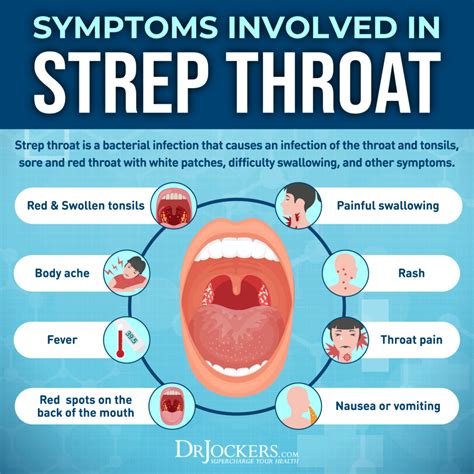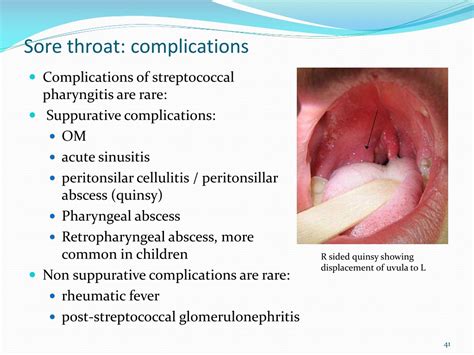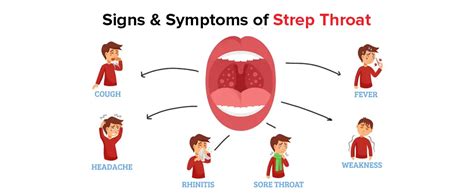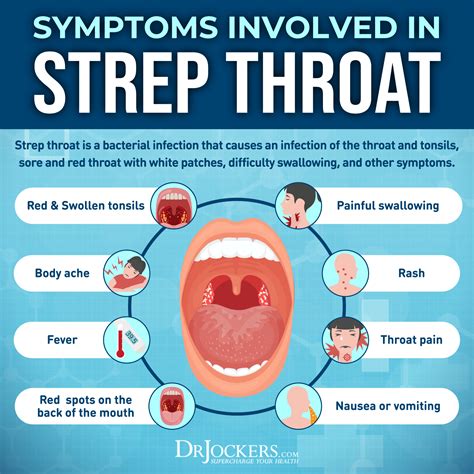Intro
Identify 7 key strep throat symptoms, including sore throat, fever, and swollen tonsils, to recognize the bacterial infection and seek timely treatment, alleviating severe throat pain and complications.
Strep throat, also known as streptococcal pharyngitis, is a highly contagious infection caused by the group A Streptococcus bacteria. It is a common illness that affects people of all ages, but it is most prevalent among children and adolescents. The symptoms of strep throat can be uncomfortable and painful, making it essential to recognize them early on to seek proper medical attention. In this article, we will delve into the 7 strep throat symptoms, their causes, and the importance of timely treatment.
The importance of identifying strep throat symptoms cannot be overstated. If left untreated, strep throat can lead to complications such as kidney inflammation, rheumatic fever, and abscesses. Furthermore, strep throat can be spread easily through close contact with an infected person, making it crucial to take preventive measures to avoid transmission. By understanding the symptoms and causes of strep throat, individuals can take proactive steps to protect themselves and their loved ones from this contagious infection.
Strep throat is typically spread through respiratory droplets, such as those produced by coughing or sneezing, or by coming into contact with contaminated surfaces. The bacteria can also be spread through close contact with an infected person, such as sharing food or drinks. The incubation period of strep throat is usually between 2 to 5 days, during which the individual may not exhibit any symptoms. However, once the symptoms appear, it is essential to seek medical attention to prevent complications and reduce the risk of transmission.
Understanding Strep Throat

Causes and Risk Factors
The causes and risk factors of strep throat are essential to understanding the infection. The primary cause of strep throat is the group A Streptococcus bacteria, which can be spread through close contact with an infected person or by coming into contact with contaminated surfaces. Risk factors for strep throat include age, with children and adolescents being more susceptible to the infection. Other risk factors include weakened immune system, poor hygiene, and close living quarters.7 Strep Throat Symptoms

Treatment and Prevention
Treatment for strep throat usually involves a course of antibiotics, such as penicillin or amoxicillin, to help combat the infection. It is essential to complete the full course of antibiotics as prescribed by the doctor to ensure that the infection is fully cleared. In addition to antibiotics, individuals can take steps to manage their symptoms, such as getting plenty of rest, staying hydrated, and using a humidifier to relieve congestion.Prevention is also crucial in reducing the risk of transmission. Individuals can take steps to prevent the spread of strep throat by practicing good hygiene, such as washing their hands frequently, avoiding close contact with infected individuals, and avoiding sharing food or drinks.
Complications of Strep Throat

Seeking Medical Attention
It is essential to seek medical attention if symptoms of strep throat persist or worsen. A doctor can diagnose strep throat through a physical examination, medical history, and laboratory tests such as a rapid strep test or throat culture. If diagnosed with strep throat, it is crucial to follow the doctor's instructions and complete the full course of antibiotics as prescribed.Managing Strep Throat Symptoms

Home Remedies
In addition to medical treatment, there are several home remedies that can help alleviate strep throat symptoms. These include: * Gargling with salt water to reduce inflammation and kill bacteria * Drinking warm liquids such as tea or broth to soothe the throat * Using a humidifier to relieve congestion * Getting plenty of rest to help the body recoverConclusion and Next Steps

We invite you to share your thoughts and experiences with strep throat in the comments below. If you have any questions or concerns, please do not hesitate to reach out. By working together, we can raise awareness about the importance of recognizing and treating strep throat symptoms.
What are the common symptoms of strep throat?
+The common symptoms of strep throat include sore throat, fever, white patches on the tonsils, swollen lymph nodes, headache, stomach pain, and loss of appetite.
How is strep throat diagnosed?
+Strep throat is diagnosed through a physical examination, medical history, and laboratory tests such as a rapid strep test or throat culture.
What is the treatment for strep throat?
+The treatment for strep throat usually involves a course of antibiotics, such as penicillin or amoxicillin, to help combat the infection.
Can strep throat be prevented?
+Yes, strep throat can be prevented by practicing good hygiene, such as washing hands frequently, avoiding close contact with infected individuals, and avoiding sharing food or drinks.
What are the complications of untreated strep throat?
+The complications of untreated strep throat include kidney inflammation, rheumatic fever, and abscesses.
